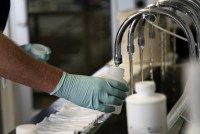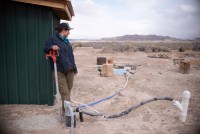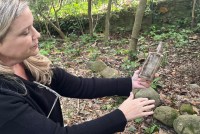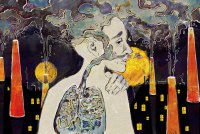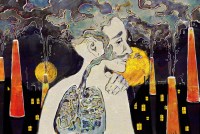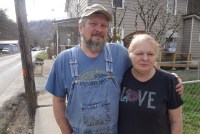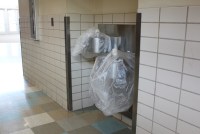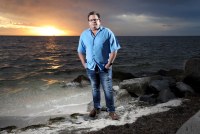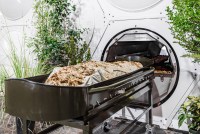Latest KFF Health News Stories
What the Health? From KFF Health News: Let’s Talk About the Weather
It’s been the summer of broken weather records around the world — for heat, rain, and wildfire smoke — advertising the risks of climate change in a big way. But, apparently, it’s not enough to break the logjam in Washington over how to address the growing climate crisis. Meanwhile, in Texas, women who were unable to get care for pregnancy complications took their stories to court, and Congress gears up to — maybe — do something about prescription drug prices. Alice Miranda Ollstein of Politico, Shefali Luthra of The 19th, and Rachel Cohrs of Stat join Julie Rovner, KFF Health News’ chief Washington correspondent, to discuss these issues and more. Also this week, Rovner interviews Meena Seshamani, the top administrator for the federal Medicare program.
Proposed PFAS Rule Would Cost Companies Estimated $1B; Lacks Limits and Cleanup Requirement
A proposed Environmental Protection Agency rule calls for companies to disclose PFAS manufactured or imported since 2011. The chemical industry is upset because such compliance would cost an estimated $1 billion, while environmental health advocates worry because the rule wouldn’t ban the chemicals outright.
Journalists Cover Air Quality, Tick Risks, and … Brazilian Butt Lifts?
KFF Health News and California Healthline staff made the rounds on national and local media this week to discuss their stories. Here’s a collection of their appearances.
California Schools Start Hatching Heat Plans as the Planet Warms
State researchers offer recommendations on how schools can become more heat-resilient in the face of global warming. Proposed changes to state law could make it easier to build shade structures.
As Water Levels Drop, the Risk of Arsenic Rises
As the West grapples with a megadrought, its driest spell in at least 1,200 years, rising levels of arsenic — a known carcinogen — in Colorado’s San Luis Valley offer clues to what the future may hold.
A medida que bajan los niveles de agua, suben los de arsénico
A medida que el oeste lucha contra una mega sequía que ha durado más de dos décadas y los estados corren el riesgo de recortes en el agua del menguante río Colorado, el Valle de San Luis ofrece pistas sobre lo que el futuro puede deparar.
Lead Contamination Surfaces in Affluent Atlanta Neighborhood
The Environmental Protection Agency recently confirmed high lead levels in an upscale Atlanta neighborhood. The location stands in contrast to many polluted sites investigated by the federal Superfund program — often in former industrial or waste disposal areas where environmental racism has left marginalized groups at risk.
¿Depresión? ¿Ansiedad? La contaminación atmosférica podría ser responsable
Las investigaciones demuestran que las partículas diminutas eluden los sistemas de filtrado del organismo al aspirarse por la nariz y la boca, y que viajan directamente al cerebro.
Depressed? Anxious? Air Pollution May Be a Factor
A growing body of research is finding links between air quality and mental health, as therapists report seeing patients with symptoms linked to pollution.
Did a Military Lab Spill Anthrax Into Public Waterways? New Book Reveals Details of a US Leak
“Pandora’s Gamble” describes how 2,000 to 3,000 gallons of wastewater potentially containing anthrax, Ebola, and other deadly pathogens spilled from an Army facility in Frederick, Maryland, in 2018.
Raincoats, Undies, School Uniforms: Are Your Clothes Dripping in ‘Forever Chemicals’?
The full health risks of wearing apparel made with PFAS, also known as “forever chemicals,” are still unknown. But states are taking action so clothing makers will remove them.
Black Lung Resurgence Drives Push to Protect Coal Miners Against Silica Dust
Since 2005, central Appalachia has recorded a tenfold increase in cases of severe black lung disease among long-term coal miners. Now, federal regulators are expected to propose a new rule to protect against silica dust, which causes the most severe form of black lung, progressive massive fibrosis.
Schools Struggle With Lead in Water While Awaiting Federal Relief
President Joe Biden said in his State of the Union address that federal funds will pay to replace lead pipes in hundreds of thousands of schools and child care centers. In the meantime, schools are dealing with high lead levels now.
Cleanup Workers Got Sick After Deepwater Horizon Oil Spill. They Want BP to Pay.
After the BP Deepwater Horizon oil spill in 2020, Rodney Boblitt’s job was to patrol a 14-mile stretch of coastline in the Florida Panhandle looking for signs of oil washing ashore. Today, the 54-year-old is among thousands of other cleanup workers who are experiencing health issues and suing BP. But proving their health conditions were caused by the oil has been challenging.
Un arma secreta para prevenir la próxima pandemia: los murciélagos frugívoros
En Montana, investigarán cómo los murciélagos de la fruta, albergan virus que, bajo determinadas condiciones del medio ambiente, pueden pasar a los seres humanos.
A Secret Weapon in Preventing the Next Pandemic: Fruit Bats
New research links habitat destruction with the spillover of viruses from animals to humans.
Sueño alterado y nervios de punta: la contaminación acústica afecta la mente y el cuerpo
Décadas de investigación vinculan la contaminación acústica no solo con la interrupción del sueño, sino también con una serie de afecciones crónicas, como enfermedades cardíacas, deterioro cognitivo, depresión y ansiedad.
Lost Sleep and Jangled Nerves: The Rising Onslaught of Noise Harms Mind and Body
Noise pollution is a growing problem that isn’t confined to the ears: It can cause harm throughout the body. California is taking baby steps to address the increasing din from traffic and illegally modified cars, but public health experts urge lawmakers to act more boldly.
For the Houma People, Displacement Looms With Every Storm
The Houma, an Indigenous tribe, has seen much of its Gulf Coast community washed away by rising sea levels and dangerous storms. Its leaders say the tribe’s lack of federal recognition makes it harder to keep rebuilding.
Listen: How Does Human Composting Work?
California Healthline’s Bernard J. Wolfson went on the air to explain a new California law that will allow people to have their bodies reduced to compost after death, an alternative to the traditional-but-toxic methods of cremation and burial.




